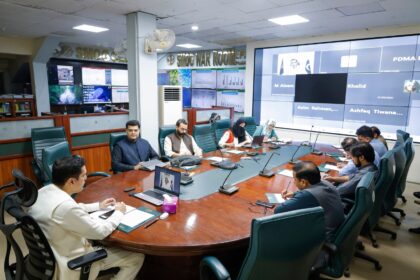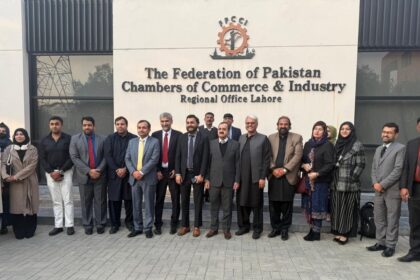Dr. Neelum Nigar opened the roundtable hosted by the Centre for Strategic Perspectives at the Institute of Strategic Studies Islamabad, urging a timely revisit of Pakistan’s climate priorities as the country prepares for COP-30 in Belem. She highlighted the urgency created by the devastating 2025 floods and called for a COP30 strategy that places adaptation and equitable finance at the centre of national planning.
Ambassador Sohail Mahmood stressed that COP-30 must move global diplomacy from promises to performance, underlining Pakistan’s limited emissions but acute vulnerability. He pointed to recent national efforts, including the finalised National Adaptation Plan (2025–2030) and the Pakistan Climate Resilience Financing Framework, as tangible steps that frame Pakistan’s COP30 strategy around resilience, institutional coordination and renewable expansion.
Ambassador Sohail argued that Pakistan’s negotiating stance will be guided by pragmatism, equity and partnership, calling for operationalisation of the Loss and Damage Fund, streamlined technology transfer and strengthened South-South cooperation. He reiterated adherence to the principle of common but differentiated responsibilities to ensure that climate burdens reflect historical emissions and current capacities.
Delivering a video message, Mr. Jamil Ahmad of UNEP described COP-30 as the ‘COP of Implementation’ and commended Pakistan’s Living Indus Initiative as an example of linking water security, biodiversity and livelihoods. He urged that Pakistan’s COP30 strategy translate commitments into measurable actions at the community level.
From the government side, Ms. Nadia Rehman urged a shift from traditional bloc alignments to an issue-based negotiation approach focused on technology transfer and climate finance. She recommended revisiting sovereign risk assessments and credit-rating mechanisms to lower borrowing costs and unlock concessional financing for climate action.
Ms. Sadia Munawar outlined Pakistan’s multi-tiered preparations for COP-30, noting national and provincial participation as well as thematic side events. She confirmed that all provinces will present resilience initiatives in Belem and reiterated the country’s aim to raise renewable energy to 60 percent by 2030 while expanding green finance instruments so COP outcomes deliver tangible adaptation benefits.
Ms. Kashmala Kakakhel provided a candid appraisal of national readiness, warning that Pakistan cannot finance resilience through debt alone and must prioritise grant-based and programmatic funding mechanisms, including active engagement with the Loss and Damage Fund. She also urged greater collaboration with the private sector and academia to develop indigenous technological solutions alongside international technology transfer.
The discussion that followed featured diplomats, experts and civil society representatives who called for stronger national commitment, enhanced regional cooperation on transboundary pollution and grassroots awareness campaigns. Participants emphasised that a forward-looking COP30 strategy should shift Pakistan’s posture from reactive crisis response to proactive innovation, local adaptation and coherent institutions.
In closing, Ambassador Khalid Mahmood thanked contributors and participants and reaffirmed ISSI’s role in shaping informed policy dialogue. He noted that insights from the roundtable will feed into Pakistan’s preparatory work for COP-30 and inform longer-term climate diplomacy and resilience planning.











